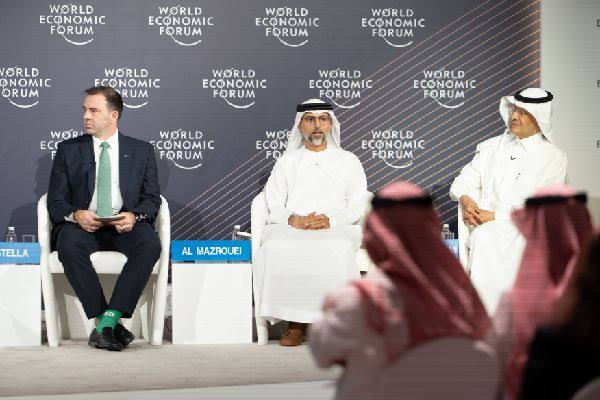UAE fully committed to balancing economic development and environmental protection

Suhail bin Mohammed Al Mazrouei, Minister of Energy and Infrastructure, underscored that the UAE’s approach to climate action is underpinned by striking balance between economic development and environmental protection through leveraging low-carbon energy solutions.
The Minister made this statement at the “Green Molecules and Hydrogen” session as part of the World Economic Forum, being hosted by the Saudi capital city, Riyadh, under the theme “Global Collaboration, Growth, and Energy for Development”.
He said, “In 2023, the UAE unveiled its National Hydrogen Strategy 2050 to bolster low-carbon industries, advance climate neutrality, and position the nation as a leading hydrogen producer by 2031. The UAE targets to produce 1.4 million tons of low-emission hydrogen annually by 2031 and 15 million tons annually by 2050.”
Al Mazrouei set out key enablers in the green molecules business, including global collaboration, policy and regulation, financing and investment, R&D and advanced technology, and sustainable commercial and economic models.
Moreover, the Minister participated in a session on the “Roadmap to Tripling Renewables”, where he outlined the key bottlenecks hindering rapid renewable deployment in emerging markets to be regulatory barriers, innovative financing, and digitalization and innovative solutions.
Reflecting on the UAE’s journey in deploying renewables, Al Mazrouei said, “The UAE’s approach to increasing the deployment of renewables is remarkable. Between 2019 and 2022, the UAE successfully doubled its renewables capacity, and by 2023, we witnessed a 70% growth in installed renewables capacity, which reached 6 GW.”
He added, “These achievements were made possible through the translation of our national net-zero goal into actionable policies. We are working in a bottom-up approach with the engagement of all segments of the community, private sector, academia, and youth.”
The Minister highlighted the importance of global partnership and collaboration to facilitate technology transfer, investment, and financing from developed countries and international financial institutions, provide policy support, capacity-building programmes, and infrastructure development assistance, while promoting knowledge sharing among stakeholders and helping mitigate risks associated with renewable energy projects, enhancing investor confidence and accelerating the transition to sustainable energy systems in emerging markets.
He said, “The UAE is a major global investor in renewables. It allocated AED200 billion to investments in clean energy projects locally until 2030, having invested AED160 billion so far. Moreover, the UAE invested AED185 billion in renewables projects in over 40 countries. Our flagship renewables company, Masdar, has made substantial renewable energy investments across the world, with a total capacity of 20 GW installed or under development. By 2030, Masdar aims to grow its global renewables capacity to 100 GW.”



